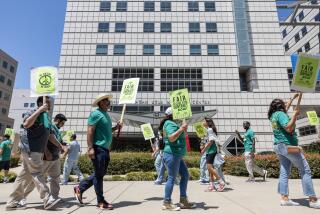Realistic Financial Help
- Share via
Roberto Godinez is a young man with a critical problem. Several weeks ago he learned that one of his kidneys was not functioning and that the other was on the verge of shutting down. Without dialysis treatment, or a kidney transplant, he faced certain death within a matter of weeks, doctors at the UCI Medical Center, where Godinez was hospitalized, told him.
But Godinez, whose wife is expecting the couple’s fourth child, is an undocumented worker from Mexico. And he has no money or medical insurance.
The UCI Medical Center is a hospital with a critical problem. It is losing money, the only one of the five state university hospitals doing so. Last fiscal year the hospital reported an $8.6-million operating loss. This year the loss may run more than $13 million. Continued losses, in fact, may force the medical center to stop treating indigent patients or eventually go bankrupt and close down, one Irvine campus official warned earlier this month.
The two critical problems meet head on daily. People like Godinez need medical help. But patients like Godinez, who are on Medi-Cal or other public programs that do not cover the costs of treating indigent patients, exacerbate the shortage of county, state and federal funds hospitals face.
It is not a problem that affects only the UCI Medical Center. But in Orange County it is the UCI Medical Center that has borne the brunt of the burden. The center has only 6% of the total hospital beds in the county. Yet it treats more than 50% of the county’s indigent patients. In fact, about seven out of of every 10 people it does treat have no private insurance and represent a financial loss. And the more poor people that are treated, the more money the medical center loses.
The medical center staff knew that when they admitted Godinez. And they knew that several days ago when they decided that Godinez would get the expensive dialysis treatment that he needs to survive, and maybe even a kidney transplant. Godinez is a greater financial risk than usual because there is a chance that even the under-funded Medi-Cal program will stop paying in a few months because of his undocumented status.
But doctors and hospital administrators had their priorities straight and put no price tag on the value of human life. The county and state must do no less in providing realistic financial support to the health-care system. There are too many people facing death and needless disability to do otherwise.
More to Read
Sign up for Essential California
The most important California stories and recommendations in your inbox every morning.
You may occasionally receive promotional content from the Los Angeles Times.













